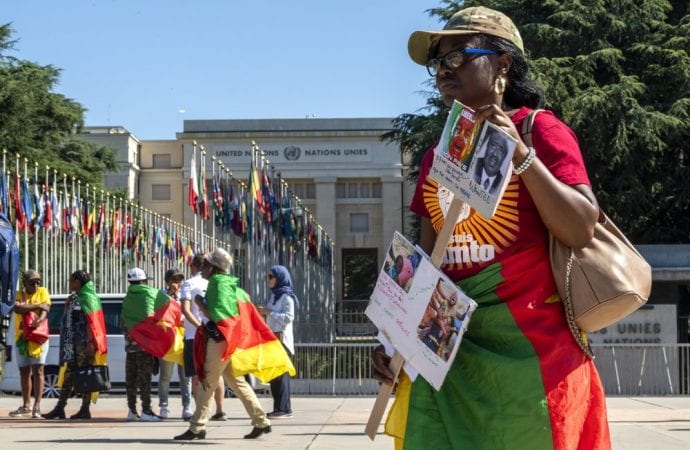A Catholic priest who runs the local Caritas for his Cameroonian archdiocese was arrested on Sunday, and a local bishop says he has no idea why.
Father Paul Njokikang was picked up early Sunday morning after celebrating Mass in Mbinfibe, near Bamenda, the capital of Cameroon’s North West region.
He was reportedly taken by security forces to a military camp at the Bafut airport.
“No reason as yet has been advanced for his arrest,” Archdiocese of Bamenda auxiliary Bishop Michael Bibi told Crux. “It is only when Father will be released that we will get to know why he was arrested.”
The archdiocese has called the arrest “arbitrary” and said Njokikang was being held illegally.
Cameroon’s English-speaking North West and South West regions have been experiencing a civil conflict since 2016, when demonstrations broke out after there were demands to use French - the majority language in Cameroon - in their common law courts and English-modeled schools.
English speakers make up around 20 percent of the country’s population and have long complained about being marginalized by the French-speaking ruling class.
After Cameroon’s security forces’ heavy-handed response - including using live ammunition on demonstrators - rebel movements arose calling for the independence of Anglophone Cameroon, saying the new country would be called Ambazonia.
In a statement issued Monday, the Humanitarian Family in Bamenda - which offers assistance to those affected by the conflict -condemned the arrest and called for the priest’s immediate release.
“Cameroon’s military is arbitrarily detaining Father Paul at their concentration and torture camp at the Bafut Airport near Bamenda,” the organization said.
The statement said the local population sees Njokikang as a local version of Mother Theresa who is known for his good works towards the poor and vulnerable people suffering due to the ongoing strife.
The priest came to prominence when he addressed the United Nations Security Council in April, describing the worsening humanitarian and security situation in Cameroon’s Anglophone regions. He also detailed the human rights abuses of the government’s security forces.
“The disappearance and death of young males is no longer news. Some of those who have been killed are persons with disabilities or special needs, or the aged who cannot run away to safety,” he told the international body.
Njokikang said both the government and the separatist fighters are committing human rights violations, “which acts as an instrument of terror to the local people.”
It is not clear if his arrest was in retaliation for his remarks at the UN. The military has not responded to Crux’s repeated requests for comment.
In the UK, the priest’s arrest was condemned by Lord David Alton, who accused the government of long-serving leader Paul Biya of cracking down on moderate voices.
“Father Paul represents a moderate Anglophone voice in an increasingly polarized conflict. The international community must demand his unconditional release,” he said in a statement.
“There can be no constructive dialogue while the Biya regime undermines the work of impartial charities. The UK should use its influence at the UN and in the Commonwealth to press the Cameroon authorities to hold genuine and inclusive negotiations,” Alton said.
According to the UN, about 530,000 people have been forced from their homes in the restive Anglophone regions. Some 3,000 people have been killed in three years of violence.
Originally a German colony, Cameroon was divided between France and Britain after Germany’s defeat in World War I.
When British Cameroon joined the already independent French Cameroon in 1961, it did so under a federal system that allowed both parts to practice the legal and educational systems inherited from their colonial powers.
However, the country’s first president, Ahmadou Ahidjo, scrapped the federation in 1972 and introduced a unitary national government through a hastily organized referendum. Most observers see this event as the seed for the current rebellion.
The government sought to address some of these issues when it organized a “Major National Dialogue” from September 30 -October 4 in Yaoundé.
The meeting came up with a series of proposals, including the adoption of a special status for the two Anglophone regions; the restoration of the House of Traditional Chiefs; the election of local governors, the immediate relaunch of certain airport and seaport projects in the two regions; the rapid integration of ex-combatants into society; and a return to the name United Republic of Cameroon.
The president released a major opposition figure - Cameroon Renaissance Movement leader Maurice Kamto - on Oct. 5 as a sign of reconciliation.
However, separatist militia leaders refused to take part in the conference, calling it a “smokescreen.”
Since the end of the meeting, separatists have intensified their attacks against the government.

